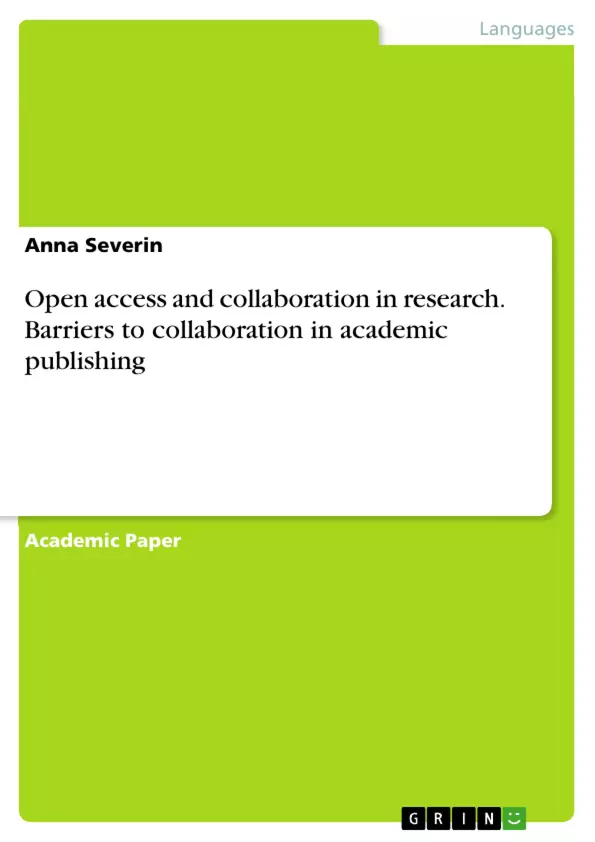This paper aims to review the scholarly literature offering criticism on the concept of open access (OA) publishing, in particular with regards to the effect of OA on researcher’s collaborative working. Relevant literature is critically reviewed with the aim of identifying barriers to collaboration in academic publishing and as to what degree OA can mediate these.
OA relates to research outputs that are free of any restrictions on access (such as subscription walls) and free of any restrictions on use and re-use of research outputs (such as copyright and license restrictions). Some scholars regard OA as a helpful tool for fostering collaborative work amongst researchers.
Observing that scientific problems have become more complex and require a joint effort, these scholars argue that knowledge creation and dissemination could be more efficient if scientists worked together. The core requirement for collaboration among researchers is commonly identified as their ability to share information freely.
Inhaltsverzeichnis (Table of Contents)
- Introduction
- Traditional academic publishing
- Open Access Publishing
- Encouraging greater collaboration
- Conclusion
Zielsetzung und Themenschwerpunkte (Objectives and Key Themes)
This paper examines the scholarly literature regarding open access (OA) publishing, particularly focusing on its impact on research collaboration. By critically reviewing relevant literature, the paper aims to identify barriers to collaboration in academic publishing and assess the extent to which OA can mitigate these barriers.
- The impact of OA on research collaboration
- Barriers to collaboration in academic publishing
- The potential of OA to promote a more open and collaborative research environment
- The role of traditional publishing models in hindering collaboration
- The potential benefits and challenges of OA for individual researchers and their fields
Zusammenfassung der Kapitel (Chapter Summaries)
- Introduction: This chapter introduces the topic of open access (OA) publishing and its potential role in fostering research collaboration. It outlines the paper's objectives and scope, highlighting the focus on identifying barriers to collaboration and evaluating OA's ability to address them.
- Traditional academic publishing: This chapter explores the shortcomings of the traditional academic publishing model, arguing that it creates barriers to collaboration by restricting access to research findings and promoting practices that prioritize individual success over collective knowledge advancement.
- Open Access Publishing: This chapter presents the arguments in favor of OA publishing as a means to overcome the limitations of traditional publishing. It highlights the potential benefits of OA for researchers, including increased visibility, citations, collaboration, and the ability to share research findings more freely.
- Encouraging greater collaboration: This chapter discusses how OA can promote a more collaborative research environment, examining various perspectives on how OA can transform scientific practices and culture. It explores the role of sharing, open communication, and collective knowledge creation in fostering collaboration under the OA paradigm.
Schlüsselwörter (Keywords)
This paper focuses on open access (OA) publishing, research collaboration, barriers to collaboration in academic publishing, traditional publishing models, and the potential benefits and challenges of OA for individual researchers and their fields.
Frequently Asked Questions
What is the main focus of this paper?
The paper examines the impact of Open Access (OA) publishing on research collaboration and identifies barriers within traditional academic publishing.
What are the core benefits of Open Access mentioned?
Benefits include increased visibility, more citations, enhanced collaboration, and the removal of restrictions on access and re-use of research findings.
How does traditional publishing hinder collaboration?
Traditional models often create barriers through subscription walls and copyright restrictions, prioritizing individual success over collective knowledge advancement.
What is required for effective researcher collaboration?
The core requirement is the ability for scientists to share information freely, which is a central premise of the Open Access movement.
Can OA transform scientific culture?
Yes, the paper discusses how OA promotes a collaborative environment by encouraging open communication and collective knowledge creation.
- Quote paper
- Anna Severin (Author), 2016, Open access and collaboration in research. Barriers to collaboration in academic publishing, Munich, GRIN Verlag, https://www.hausarbeiten.de/document/494402


